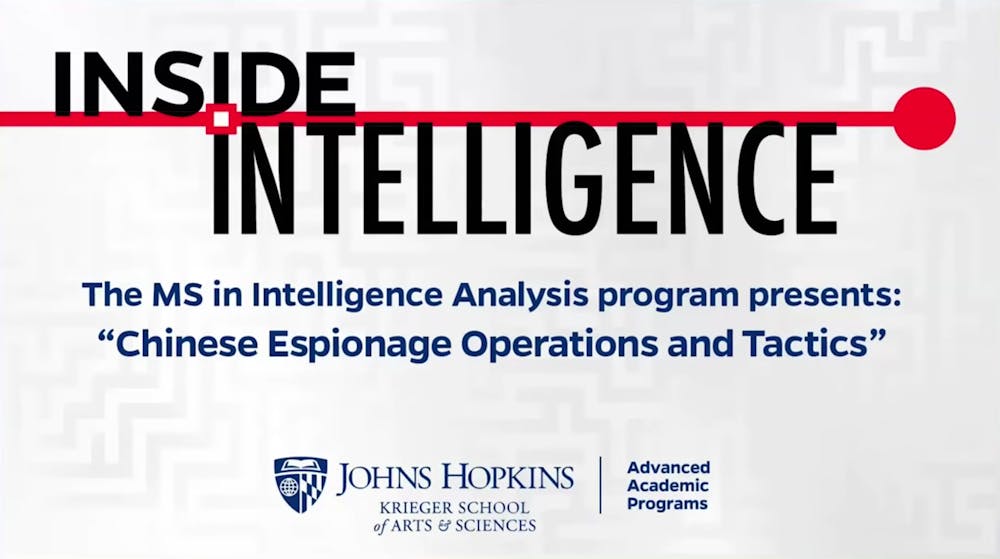On Nov. 12, the Krieger School of Arts and Sciences’ Advanced Academic Programs (AAP) hosted Nicholas Eftimiades, assistant teaching professor of homeland security at Penn State Harrisburg, for another entry in the Intelligence Analysis program’s Inside Intelligence lecture series. Eftimiades, who holds over three decades of experience in federal intelligence, provided the audience with an in-depth explanation of the contemporary Chinese espionage scene.
Eftimiades opened the lecture with a basic description of the espionage he focuses on: economic espionage, in which trade secrets, technology or economic information is unlawfully obtained by a foreign entity. These actions, Eftimiades explained, can either be on behalf of foreign government entities directly or on behalf of a foreign company acting independently of its government; Eftimiades asserted that in regards to espionage from the People’s Republic of China (PRC) on U.S.-based companies, both forces can work in tandem.
Using a compiled database of Chinese espionage cases, Eftimiades was able to provide a number of descriptive infographics and statistics as examples of the information that can be used to counter Chinese espionage. These data, Eftimiades explained, are vastly important for U.S. companies as they look to protect against espionage.
“[The data] helps if you’re on the other side of that, setting up defenses and doing pre-briefings to companies, where the specific target sets are,” Eftimiades said.
Following an overview of the lecture’s contents, Eftimiades described a number of examples of PRC-based espionage, in which individuals in the U.S. were recruited to conduct espionage on behalf of the Chinese government in both military and civilian cases. Those recruited ranged from engineers to military officials. These examples were then used to analyze trends in PRC espionage. Key focuses included an increase in the use of social media and personal relationships to conduct espionage. Eftimiades credits a vast majority of the cases he has analyzed to either China’s Ministry of State Security or its People’s Liberation Army, with most of these operations being economic espionage.
“[China] does their targeting through social media, family, travel to China, [...] and business relationships in China and overseas — so we’ve seen basically those four categories of how people are identified and targeted,” Eftimiades explained.
Eftimiades was also able to identify the specific sectors most affected by these operations. By a large margin, entities in the information technology and aerospace fields saw the highest risks of PRC-based espionage attacks. Given these trends, Eftimiades anticipates continued growth in targeting new and emerging technology sectors as PRC tradecraft (or the methods and tactics used to conduct espionage) evolves.
Wrapping up the presentation, Eftimiades connected the cases he’d reviewed earlier to his analysis of PRC tradecraft trends, advising the audience on the key takeaways that were consistent throughout each case, noting especially how tactics would become more focused as access to sensitive information became more direct in each case.
“As the person gets closer to giving real classified information, the security issues get tighter [...] we see a separation of tradecraft, getting more intense as a person provides more information,” Eftimiades elaborated.
The lecture then shifted to a question-and-answer section, in which attendees discussed specific vulnerabilities that are used in economic espionage and how these vulnerabilities may be addressed on a large scale.
In an email to The News-Letter, organizer of the event and Director of the MS in Intelligence Analysis program Dr. Michael Ard explained his reasoning for hosting Eftimiades on the Inside Intelligence series, highlighting his expertise on Chinese espionage and his prominence within the intelligence community.
“Nick Eftimiades is a well-known counterintelligence analyst and an acknowledged expert on Chinese espionage. I've read his books and articles and have seen him speak before, so I knew he'd be a great “Inside Intelligence” guest,” Ard wrote.
Ard then noted that another factor that he considers when selecting speakers is an interest in covering the wide field of intelligence analysis — a field that is both broad and competitive.
“It is a good forum to explore aspects of intelligence that don't get sufficient attention, such as liaison work or alternative analysis [...] We had the former ambassador to Russia, John Sullivan, on the program a few months ago, and he gave a fascinating talk,” Ard wrote.
Ard concluded his email with a discussion of how the Intelligence Analysis program at Hopkins prepares students who plan to work in the field.
“We emphasize improving writing and communication skills, vital skills for success in the field,” Ard wrote. “We are constantly updating our curriculum to capture changes in this “fast-paced” environment, such as our courses on private sector intelligence and AI in the intelligence community. Intelligence studies is a crowded field, so we can't be complacent!”





